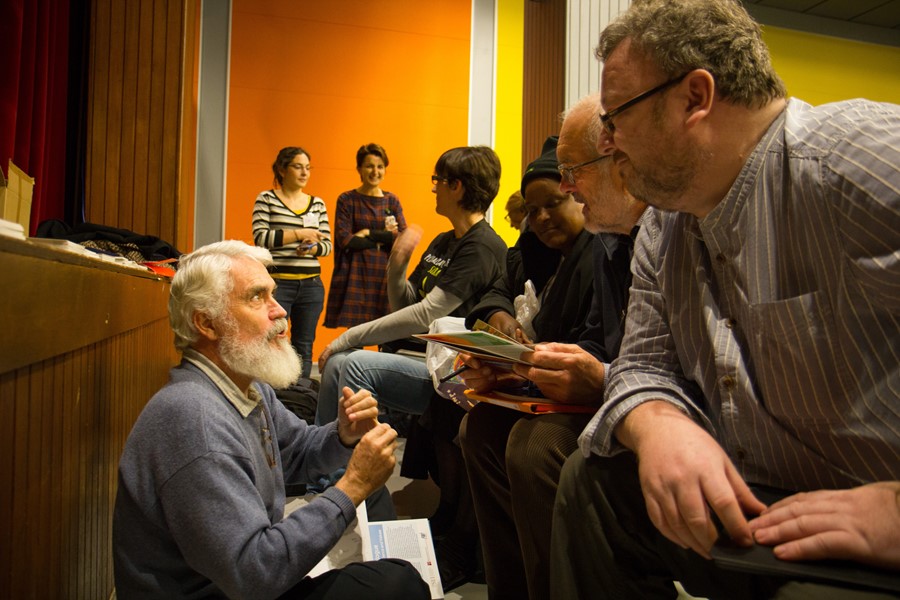
A group of young people learn how to respect diversity, care for the forests, and act for their conservation in the Philippines, as they understand how important it is for the life of their community.
At Apu Palamguwan Cultural Education Center we have over 300 children participating in elementary education in their own language. We are seeking to sustain a high school, but for the older children who do not want to continue with high school, there are few options for learning but much energy.
So we started the youth program Tuen hu Uyag (Learning and Life) that gathers together many of the youth in the Upper Pulangi valley who are not in school so that they can enjoy and respect each other, share their hopes and interests, as they learn skills and attitudes that prepare them to find a job, a livelihood, and work in their local community. Many times, parents and local officials are surprised by the transformation in their participation at home and in their communities.
We teach masonry at times, sewing, crafts, and carpentry and now forest management. The ancestral domain of the indigenous community has wonderfully valuable mossy forest with continuous clean water that serves over six provinces. But there is no ecological service payment to the community and they are under much threat to cut the forest. People were losing sight of the value of this service and rooting of the culture in the relations with the land.
Under the Jesuit Conference of Asia Pacific, we started a program of Flights for Forests (anyone can join) where people give five US dollars for each flight that they take. So far it allows us give a subsidy to four youth who are protecting the forest line and planting indigenous tree species, especially the key 20 species that are the “pillars of the forest.” We need continuing support for this program and with the drought upon us, we fear the forest fires may catch hold of the area.
They are training others and we hope to be able to train youth from all over Mindanao to care for their forests. We are planning to construct a new Culture and Ecology Center using mainly the local giant bamboo that grows extensively in the area. This Center will accommodate visitors and groups wanting to engage with the diversity of life and integral ecology of the area so that the children and youth of the area have a future they are proud of and can encourage others to care for the Earth. We are always looking for volunteers to work with us for a year or two.
This gives us some option to face the world of “loads and loans” down the valley, loads that are prepaid payments for mobile phones and loans for motorbikes that often they cannot afford or sustain. There needs to be more in life and the ability to sustain young families that often have one parent leaving for work and weeks away from home.
I am just someone who stayed a little longer and they have changed my name from Peter Walpole to Pedro. It does not matter any longer where I come from, just that I am there. And now I am Amay Pedro, the old man with white hair; we have grown accustomed to each other. I am a hydrologist by profession, and as we have cut much of the forests of Asia so I now go out to work on disaster risk reduction in areas of landslide, debris flows, and floods.
The experience of sharing this story at the CIDSE meeting with others was good. I felt everyone at the gathering had a story to share and wanted to get closer to these experiences of life. With youth coming from the cities they often seek opportunities to experience basic community life and how we have to get on with everyone and find ways to work through problems together. Then the problems are not so great.
I have learned it is not so difficult to live at the perceived margins of society. It’s not about solving problems but more about living and relating with people. It is a beautiful life when there is time to care and to go deeper into life’s meaning. We all need some time at the margins where gratitude and generosity grow from within and last a lifetime.
Article by Fr. Pedro Walpole Fr. is the Director of Research at the Institute of Environmental Science for Social Change in the Philippines and the Coordinator of Reconciliation with Creation for the Jesuit Conference Asia Pacific. He practices sustainable environment and community land -management in Southeast Asia.
Flights for forests
Aviation accounts for 4 to 9% of the climate change impact of human activity. Today, with more people flying every day, air travel has become a major contributor of greenhouse gas emissions and thus, high environmental damage.
Acknowledging this issue, the Jesuit Conference of Asia Pacific (JCAP) launched an initiative to mitigate the impact of their travels in the Asia Pacific region. For every travel scheduled, a voluntary contribution of 5 dollars is pooled in a fund. This fund is used to support community-led forest renewal initiatives in areas of Jesuit engagement in the region.
The idea is to increase awareness of our impact on the environment, while supporting and strengthening local initiatives.
http://sjapc.net/what-we-do/flights-forests
